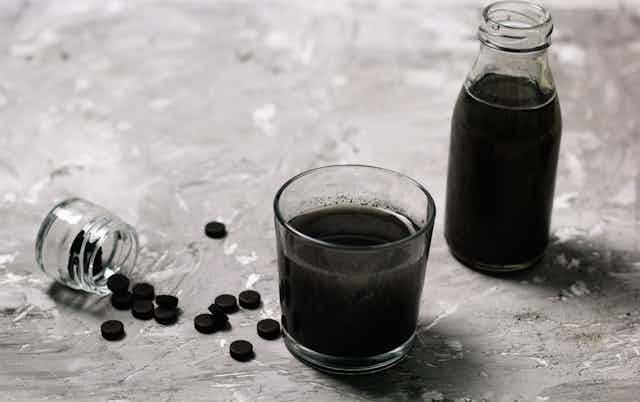On her Goop website, Gwyneth Paltrow claimed that charcoal lemonade was one of the “best juice cleansers”. That was in 2014. Today, charcoal products – from croissants to capsules – are everywhere. Even high street coffee chains have taken to selling charcoal “shots”.
Some vendors of these products claim that activated charcoal can boost your energy, brighten your skin and reduce wind and bloating. The main claim, though, is that these products can detoxify your body.
It’s easy to see where the claim that activated charcoal can detoxify the body comes from: it is used in emergency medicine to reduce the toxic load when someone has consumed poison or overdosed on medication. Charcoal binds to poison in the gastrointestinal tract and stops it from being absorbed into the bloodstream. The toxins are then passed out of the body in the stool.
However, this detoxifying action is another case of the non-scientific nutritionists seeing the medical use for something and misinterpreting its application.

Four reasons to avoid it
Although consuming activated charcoal may seem like a harmless health trend, there are several reasons you should avoid these products.
Activated charcoal will bind with all kinds of things including some of the vitamins, minerals and antioxidants in your food. Charcoal is sometimes added to fruit or vegetable juice and sold as a “shot”. Unfortunately, the vitamins in the fruit and veg probably won’t be absorbed because of the charcoal. You’d be better off just having the juice.
Activated charcoal can bind with some medications, including some antidepressants and anti-inflammatory medications, causing them to be less effective. This could have serious health consequences for some people, but it’s not explained on bottles or packaging where activated charcoal is being sold.
Activated charcoal will only bind with whatever particles are in your stomach or intestines at the time that you take it. It works by coming into physical contact with your intestinal contents. If you’re trying to use it to detox from the alcohol and kebab you had the night before, it won’t do anything at all because they have been absorbed into your bloodstream already.
Activated charcoal slows down your bowel and is known to cause nausea and constipation (and black stools).
Gas and bloating
In the 1980s some research suggested that activated charcoal can bind with gases produced during digestion and reduce wind and bloating. They showed that if you eat a meal that typically causes gas and then take charcoal, it reduces the amount of gas that is produced. However, there were later studies showing that this was not of benefit when taken as a supplement alongside the participants’ normal diets.
These studies are very old, and while activated charcoal may help to reduce wind under certain circumstances, for some people, because of the effects it also has on binding nutrients and drugs, it is not recommended for managing wind and bloating.
There are great treatments for wind and bloating that are really effective, such as reducing the fermentable carbohydrates in your diet (the low FODMAP diet) and the use of certain probiotics for irritable bowel syndrome.
Everyone is looking for a quick fix to wellness, and while we are all struggling with maintaining our energy levels, eating well and exercising while living busy lives, it is easy to be sucked in by clever marketing and celebrity endorsements.
The detox market is huge and highly misleading. While the common perception is that our daily lives and dietary habits (including alcohol intake) cause a build up of “toxins” in our system, there are no products or diets that will impact on this, regardless of their marketing budget or how many “influencers” tell you otherwise. We are often sold the idea that our diets are somehow “toxic” when the reality is that, aside from ingesting poison, even fast food doesn’t contain anything toxic.
You already have the means to detoxify your body (your liver and your kidneys do a fine job of this), so don’t waste your money. The last thing you want to do is make your food less nutritious by adding an unnecessary, indigestible compound.
More on evidence-based articles about diets:

